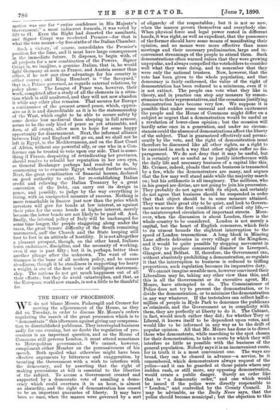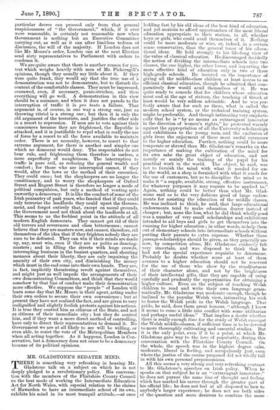THE RIGHT OF PROCESSION.
WE do not blame Messrs. Pickersgill and Cremer for moving the adjournment of the House, as they did on Tuesday, in order to discuss Mr. Monro's orders regulating the march of the great procession which is to " demonstrate " this afternoon against giving any compensa- tion to disestablished publicans. They interrupted business sadly for one evening, but no doubt the regulation of pro- cessions is an important question, and as the House of Commons still governs London, it must attend sometimes to Metropolitan government. We cannot, however, compliment either Member on the persuasiveness of his speech. Both spoiled what otherwise might have been effective arguments by bitterness and exaggeration, by taunting the Government with a wish to interfere with the democracy, and by asserting that the right of making processions at will is essential to the liberties of the subject. To accuse a Government created and supported by a democratic vote of assailing a demo- cracy which could overturn it in an hour, is almost an absurdity, and the right of demonstration has ceased to be an important guarantee of liberty. It may have been so once, when the masses were governed by a sort of oligarchy of the respectables ; but it is not so now, when the masses govern themselves and everybody else. When physical force and legal power rested in different hands, it was right, as well as expedient, that the possessors of the former should have some means of manifesting their opinion, and no means were more effective than mass meetings and their necessary preliminaries, large and in- convenient Streamings of the people to attend them. Such demonstrations often warned rulers that they were growing unpopular, and always compelled the voteholders to consider well what they were doing, and to remember that they were only the national trustees. Now, however, that the vote has been given to the whole population, and that democracy is fairly enthroned, the value of the right of demonstration has been reduced to a minimum, even if it is not extinct. The people can vote what they like in theory, and in practice can stop any measure by remon- strances to their representatives, and the occasions justifying demonstration have become very few. We suppose it is possible that under some unusual and sudden excitement the people and the House of Commons might differ on a subject so urgent that a demonstration would, be useful as a revelation of lower-class opinion ; but the occasion will hardly arise once in a generation, and under no circum- stances could the absence of demonstrations affect the liberty of the subject. That is guaranteed effectively and perma- nently by the vote, and the right of demonstration must therefore be discussed like all other rights, as a right to be exercised in such a way that other rights suffer no dis- paragement. We do not deny that it may be useful, but it is certainly not so useful as to justify interference with the daily life and necessary business of a capital like this. Mr. Cremer, indeed, pleads that such business is transacted by a few, while the demonstrators are many, and argues that the few may well stand aside while the majority march on ; but his arithmetic is all imaginary. The millions, who in his gospel are divine, are not going to join his procession. They probably do not agree with its object, and certainly do not agree that business should be suspended in order that that object should be in some measure attained. They want their great city to be quiet, and look to Govern- ment to secure the first condition of civilised city life,— the uninterrupted circulation of important streets. More- over, when the discussion is about London, there is the whole country to be considered. London is not merely a capital, but the heart of English Commerce, which feels to its utmost bounds the slightest interruption to the speed of London transactions. A long block in Mincing Lane affects deliveries in every village of the Kingdom, and it would be quite possible by stopping movement in the City to produce commercial disaster in Liverpool, Glasgow, and Belfast. If, therefore, the Government can, without absolutely prohibiting a demonstration, so regulate it that the interruption to business is reduced to triffing proportions, such regulation becomes its imperative duty. We cannot imagine sensible men, however convinced their Liberalism may be, taking any other view than this, and this is all the Government or its executive agent; Mr. Monro, have attempted to do. The Commissioner of Police does not try to prevent the demonstration, or to divide the demonstration, or to minimise the demonstration in any way whatever. If the teetotalers can collect half-a- million of people in Hyde Park to denounce the publicans as.criminals, and the Government as in complicity with them, they are perfectly at liberty to do it. The Cabinet, in fact, would much rather they did; for whether Tory or Liberal, it knows itself to be dependent upon votes, and would like to be informed in any way as to the drift of popular opinion. All that Mr. lionro has done is to direct those who demonstrate, while marching to the spot chosen for their demonstration, to take a route by which they will interfere as little as possible with the business of the general population. Nobody says it is an inconvenient route, for in truth it is a most convenient one. The ways are broad, they can be cleared in advance—a service, be it remembered, which demonstrators always request of the police—and it can be guarded at those points where any sudden rush, or still more, any opposing demonstration, would create a public danger. Surely an order like that is "a democratic order," and one which would be issued if the police were directly responsible to "London," and controlled by the County Council. It may be advisable, as the Daily News says, that the police should become municipal ; but the objection to this particular decree can proceed only from that general suspiciousness of "the Government," which, if it ever were reasonable, is certainly not reasonable now when Government is nothing but an Executive Committee carrying out, as well as it can after limitless tedium of discussion, the will of the majority. If London does not like Mr. Monro's order, London can at the next Election send sixty representatives to Parliament with orders to condemn it.
We are quite aware that there is another reason for pro- test which weighs heavily with men of Mr. Pickersgill's opinions, though they usually say little about it. If they were quite frank, they would say that the true use of a demonstration was not to demonstrate, but to disturb the content of the comfortable classes. They must be impressed, overawed, even, if necessary, panic-stricken, and then everything will go well. A demonstration in this view should be a nuisance, and when it does not parade to the interruption of traffic it is pro tanto a failure. That argument is, of course, in one way a strong one, just as throwing vitriol is a strong one ; but then it is only the old argument of the terrorists, and justifies the other side in a resort to repression. If men are to vote against their consciences because they are frightened, the Republic is attacked, and it is justifiable to repel what is really the use of force by a resort to all the force available to maintain order. There is no necessity, however, to resort to that extreme argument, for there is another and simpler one which no democrat would deny. The respectables do not bear rule, and frightening them therefore is useless, a mere superfluity of naughtiness. The interruption to traffic is pure evil, as reducing the general wealth and comfort ; for those who are interrupted cannot, if they would, alter the laws or the method of their execution. They could once ; but the shopkeepers are no longer the constituency, and to worry the shopkeepers of Oxford Street and Regent Street is therefore no longer a mode of political compulsion, but only a method of -venting spite unworthy a democracy. It is like the conduct of some of the Irish peasantry of past years, who fancied that if they could only terrorise the landlords they could upset the Govern- ment, and forgot entirely that, except on moral grounds, the Government need not think about the landlords at all. This seems to us the feeblest point in the attitude of all modern English democrats. They cannot get rid of their old terrors and reverences and class bitternesses ; cannot believe that they are masters now, and cannot, therefore, rid themselves of the idea that if they frighten nobody they are sure to be defeated. They can win if their minds are made up, nay, must win, even if they are as polite as dancing- masters ; and in filling the streets with huge crowds, interrupting business in the busiest quarters, and shouting menaces about their liberty, they are only impairing the amenity of their own city, and diminishing the money which must in the end come into their own hands. They are, in fact, implicitly threatening revolt against themselves, and might just as well impede the arrangements of their own demonstrating Committees, and think that they would somehow by that line of conduct make their demonstration more effective. We suppose the ‘‘ people " of London will learn some day that Mr. Monro is their agent, acting under their own orders to secure their own convenience ; but at present they have not realised the fact, and are given to very undignified and slightly foolish protests against his actions. It is true they control him as citizens of the State, and not as citizens of their immediate city ; but they do control him, and if they want a more direct method of controlling, have only to direct their representatives to demand it. No Government we are at all likely to see will be willing, or even able, to resist the vote of the Metropolitan Members when all acting together. As it happens, London is Con- servative, but a democracy does not cease to be a democracy because of its political opinions.





































 Previous page
Previous page